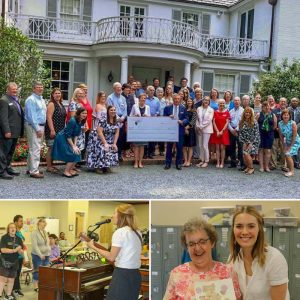Monarch Creative Arts and Community Center Faces the Music with New Therapy Program
Music Therapist Rachel Shell stands near the piano, her guitar in place, leading the class in learning the lyrics to a new song. Her eager participants clap, sway side to side and sing passionately.

(Top) North Carolina Community Foundation members gather together to present the grant award for Monarch Voices to MCACC; (bottom left) Music Therapist Rachel Shell leads MCACC participants in a rousing round of “Leaning on the Everlasting Arms”; (bottom right) Lisa Rosy presents Monarch Voices Instructor Rachel Shell a collage she made for her.
With encouraging words, Shell enthusiastically directs the group. “I think we got it. What do you guys think?” she asks the members of her morning class. The joy is evident on their faces.
Music has become an important part of their day.
Monarch Voices, the newly introduced music therapy program at Monarch’s Creative Arts and Community Center (MCACC) in Moore County’s Southern Pines, is attracting an ardent following of men and women eager to learn lyrics, play instruments and incorporate dance movements. Music classes have been offered as an integral part of their day, but this year-long, structured program will dive deeper into the instructional and therapeutic potential of music.
MCACC’s Voices is made possible through the support of the Moore County Unrestricted Endowment Fund, a component of the North Carolina Community Foundation, as well as contributions from generous, individual donors.
Music is not new to MCACC and can be heard daily throughout the facility. The center’s course offerings include pottery, art, dance and music programs for the 60 adults with intellectual and developmental disabilities (I/DD) who attend.
Shell, a board-certified music therapist, will lead the music therapy program that is geared to provide focused opportunities for learning, skill development and engagement. She owns Birdsong Music Therapy in Moore County, and has seen in her practice how music has the ability to change lives.
The Voices curriculum is divided into four, 10-week sessions, and is designed to bring out each participant’s self-expression, enhanced communication and speech, and exploration of autonomy. “They show up and are ready to go. They are eager to participate,” Shell says of the MCACC singers during her twice weekly visits.
Content covered during the Voices sessions will vary based on the group’s interests and skills and may include vocal choir, music and movement, an instrumental group and tone chime group. At the end of the program, participants will showcase their skills during a community performance.
MCACC’s Community Engagement Team Leader Bob Huber knew that music therapy would be well received. His over 22 years of experience of working with individuals with I/DD and mental illness, in combination with his over 30 years as a musician, allows an understanding of the power music has in building relationships, self-confidence and community. Huber typically sits in on the sessions accompanying Shell on the piano.
In a short time, Huber and Shell can see the benefits of the music therapy program. The participants have built self-confidence, improved self-esteem, accomplished problem-solving skills and collaborated.
A music therapy program assists the MCACC participants to leave any frustrations, disagreements or problems at the door. “They have to work as a team, setting aside any differences,” Shell notes. “They enjoy their time in class while learning musical terms such as chorus and lyrics.”
What have been the reviews for Voices at MCACC? Participant Lisa Rosy designed Shell a collage and presented it to her with a hug. “It’s to show you how much I love you,” Rosy told Shell.
Posted on: Monday August 13, 2018
